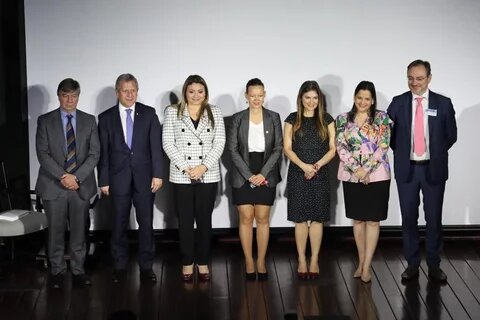On 1 and 2 June, the Dialogue Sessions "New Partnerships for Development" between the European Union (EU) and Central America were held in Panama City at the Palacio Bolivar, with the objective of providing a platform for renewed political and technical dialogue to strengthen and give visibility to the bi-regional partnership, while discussing and proposing ways to jointly address the pending development challenges in the framework of sustainable post-pandemic recovery.
The EU-Central America Dialogue Sessions were addressed to policymakers from Central American countries and the EU, representatives of international and multilateral organisations (including UN agencies, multilateral development banks and cooperation agencies) and representatives of the private sector and civil society, experts and academics. They were developed through working sessions that addressed the elements and approaches that make up the new cooperation agenda to face the growing global challenges; the digital, green, friendly and just transition; as well as scientific cooperation, risk management and preparedness for future disasters and pandemics.
The conference was opened by the President of the EU-LAC Foundation, Leire Pajín; and the Panamanian Ministers Erika Mouynes, Doris Zapata and María Inés Castillo, of Foreign Affairs, Labour and Social Development respectively. They were accompanied by Marcelo Lucco, Ambassador of Argentina in Panama, representing the PPT CELAC; Federico Bonaglia, Deputy Director of the Development Centre of the Organisation for Economic Co-operation and Development (OECD); and Chris Hoornaert, EU Ambassador in Panama and representative of the European Co-Presidency of the EU-LAC Foundation’s Board of Governors.
Those present articulated the joint goal of building strategic bridges between the EU and Central America, considering the need for a strengthened bi-regional partnership in times of a reconfiguration of the geopolitical scenario, and to prioritise post-pandemic recovery and dialogue for sustainable development. They agreed that the holding of this conference, a few days after the visit of the High Representative of the European Union for Foreign Affairs and Security Policy and Vice-President of the European Commission, Josep Borrell, to Panama, took place at an opportune moment for the EU-LAC strategic partnership, which allows to resume the discussion on cooperation at the regional level and to initiate joint projects. In this regard, the President of the EU-LAC Foundation, Leire Pajín, expressed the interest and purpose of the EU-LAC International Foundation to facilitate spaces for greater coordination between political, economic and social actors in Central America and the EU, aimed at developing concrete proposals in line with the 2030 Agenda.
Afterwards, José Antonio Sanahuja, Director of the Carolina Foundation, gave a keynote speech on "The keys to revitalising the post-pandemic regional strategic partnership and the new world order". The working sessions during the two days in Panama were divided into seven panels: Panel 1, with representatives from the OECD, CAF, the EU and ECLAC, focused on the pending challenges of development in Central America, approaches and development metrics for a new international cooperation agenda. In panel 2: "Association Agreements as a restructuring element of a new cooperation agenda", the joint working document of the Carolina Foundation and the EU-LAC Foundation entitled "The Association Agreement between the European Union and Central America: a potential to be exploited" was presented by the author Pedro Caldentey del Pozo. Then, panellists from the AIG, the Panama Maritime Authority, ASIET, CAF and SISCA debated in panel 3 on the contributions and contributions of cooperation towards a just digital transition. The closing of the first day of the conference dealt with the green transition and the challenges of shaping national and regional agendas around this issue, to which the EU gives special priority in its cooperation policy. Representatives of the EIB, IDB, AGEXPORT, SICA and EUROsociAL+ contributed their experiences and programmes to this discussion.
On Thursday 2 June, the President of the EU-LAC Foundation, Leire Paijín, and the Vice-Minister of Foreign Affairs of Panama, Jones Cooper Seferlis, opened the debate on the lessons learned during the pandemic and the perspectives and challenges for public policies in Central America and Europe in the face of future pandemics. This was followed by multi-stakeholder dialogues between representatives of regional and multilateral organisations, NGOs and government entities during panel 5, "How to build resilience through good practices, such as SICA and CEPREDENAC, WFP, CLRAH, Fundación Guatemala, CABEI and ECHO" and panel 6 "How to empower public policies for disaster risk preparedness and future pandemics in Central America" together with representatives of the United Nations, such as UNDRR and UNDP, and Fundación Natura. Finally, the seventh panel on EU-Central America scientific cooperation as a platform for a new transition was held, with panellists from the European Commission, CYTED, the Uruguayan Agency for International Cooperation (AUCI), INDICASAT AIP, and the Copernicus programme.
The EU-Central America Dialogue Sessions were highlighted by the presence of high-level panellists and experts from both regions and enabled a very fruitful exchange between the main actors and institutions of the bi-regional relationship.
In the framework of the conference, the International Forum on Youth and Work was held in parallel, which dealt with initiatives and strategies to improve youth employability and strengthen post-pandemic recovery, based on the exchange of lessons learned from the policies adopted by the governments of Central America before the pandemic and in the context of its confrontation and recovery. The forum was part of the "Employability and Employment" axis of the Plan for the Recovery, Social Reconstruction and Resilience of the SICA Region (Plan 3R).
